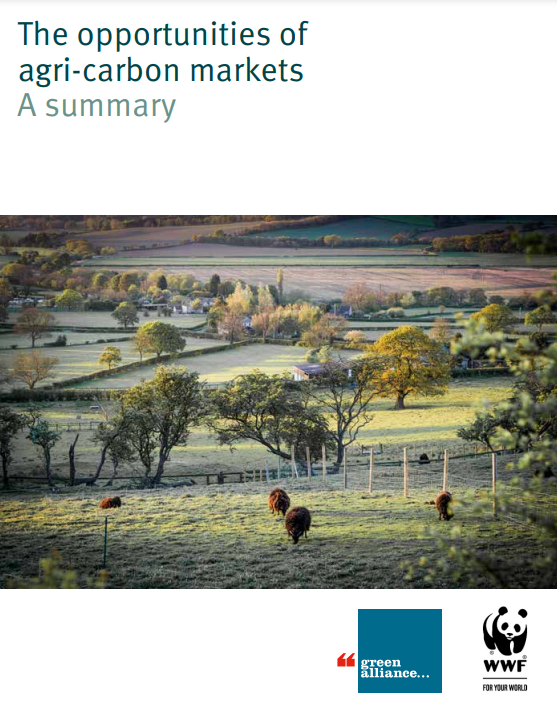The opportunities of agri-carbon markets - A summary

Report by Green Alliance for WWF & Tesco exploring carbon markets.
Introduction:
The 2015 Paris Agreement aims to limit global warming to 1.5o C compared to pre-industrial levels by reducing greenhouse gas emissions to net zero, through a combination of emission reductions and carbon removal. To achieve this, the UK will need to make major changes in the way it uses land. UK emissions from agriculture, land use and peatlands were 58 MtCO2 e in 2017, with agricultural emissions accounting for about nine per cent of the country’s total emissions. The Climate Change Committee says that these emissions could be reduced by 64 per cent by 2050 through a combination of low carbon farming practices, afforestation and agroforestry, peatland restoration, bioenergy crops and by cutting consumption of food responsible for high carbon emissions.1 These changes are likely to be stimulated by a combination of government and private investment, eg in new agri-environment schemes and through voluntary carbon markets. Several voluntary initiatives driving net zero declarations across the private sector, such as the United Nations’ Race to Zero campaign and the Science Based Targets initiative,2 are leading to greater interest in carbon markets.
In the UK, most voluntary carbon offsets are provided by afforestation projects, via the Woodland Carbon Code. Others are delivered through peatland restoration, via the Peatland Code.3 These voluntary standards provide guidance for project developers to deliver high integrity carbon storage and assurances to voluntary carbon credit buyers that the climate benefits they purchase are real, quantifiable, additional and permanent. New standards are now being developed in the UK, funded by the Environment Agency’s Natural Environment Investment Readiness Fund. These include the creation of a UK Farm Soil Carbon Code to reward farmers for the carbon sequestration benefits of more regenerative on-farm practices, and a Hedgerow Carbon Code.4 Here, we outline the main conclusions of a longer review of the state of the science on a range of opportunities for sequestering carbon on working farms in the UK. We also explore the role of voluntary carbon markets in accelerating carbon sequestration on farms and provide recommendations on the development of a credible agri-carbon sequestration market in the UK. We conclude that farmers should be wary of selling carbon offset credits to buyers upfront as this could harm their own decarbonisation efforts. It is likely to be more beneficial for them to work together with food businesses to reduce emissions and sequester carbon within the supply chain. This will require new standards that guarantee the permanence and accurate measurement of carbon stored. We recommend new requirements to ensure that those making carbon neutral or net zero claims, through the purchase of carbon credits generated from land, are also reducing their own emissions.
